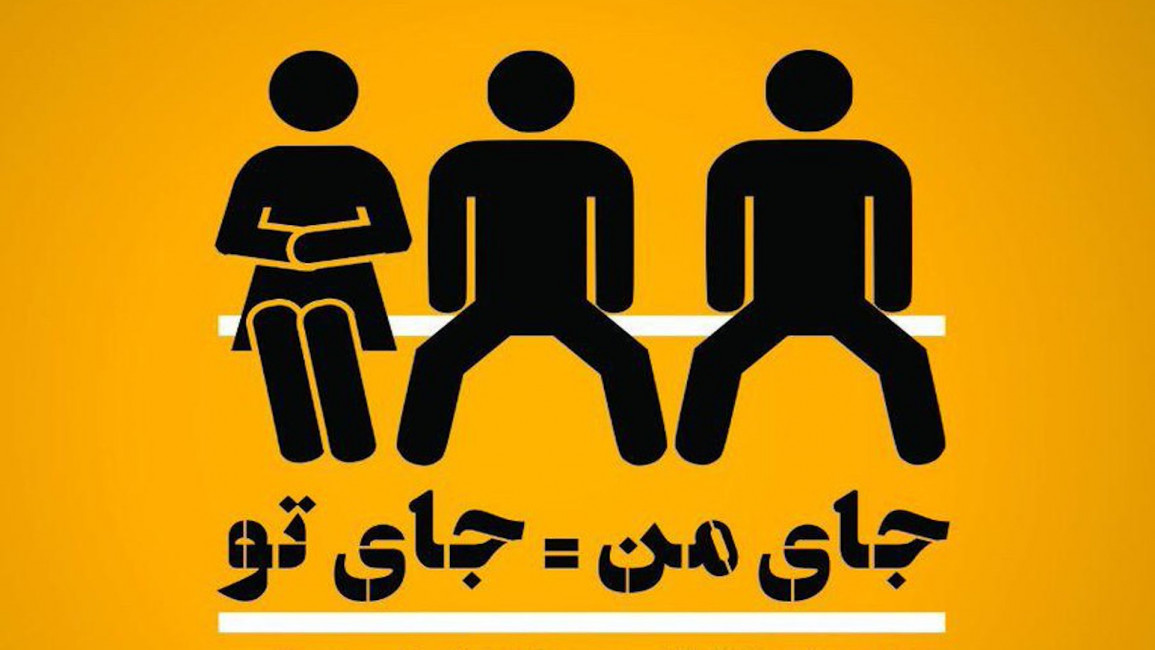Manspreaders and cat-callers must be lashed, Iranian women demand
Manspreaders and cat-callers must be lashed, Iranian women demand
Iranian activists are demanding authorities enforce a law that would see men guilty of harassment and manspreading in public receive up to 74 lashes, fines and jail time.
2 min read
Men who 'man-spread' should receive 74 lashes, demand women's rights activists [Twitter]
Iranian women's rights activists are demanding the authorities enforce a law that would see men guilty of harassment, catcalling and manspreading in public receive up to 74 lashes.
The Tehran municipality has been presented with a series of posters designed by a feminist group calling attention to a law that provides for corporal punishment for men harassing women.
The posters, which the activists reportedly want the authorities to place in public, recall that Iran's Islamic Criminal Code punishes "immoral acts" in public, which they say includes harassment against women.
The proposed posters show men occupying outsized spaces on public transport - a practice known as manspreading - men in cars and motorbikes catcalling a woman; and men chasing a solitary woman on a street.
The posters have been retweeted thousands of times, triggering a fierce debate on social media.
They were re-tweeted by Shahindokht Molaverdi, a mininster and the Iranian president's special assistant for citizens' rights.
The posters received some criticism for apparently endorsing corporal punishment.
Under Iran's interpretation of Islamic law, a wide range of offences, including homosexual and extra-marital relations, are punishable by death, lashes or even crucifixion.
Some also recalled the authorities' ill-treatment of women in the Islamic Republic.
Iranian women have recently been protesting the state-imposed dress code that forces them to wear the headscarf in public or face prosecution.
Scores have been arrested in recent weeks.
The Islamic Republic's dress code - in place since the 1979 revolution - considers Islamic veiling or hijab obligatory for any female aged above 13.
It also states that women should cover themselves from head to toe, while disavowing any figure-hugging dress.
The Tehran municipality has been presented with a series of posters designed by a feminist group calling attention to a law that provides for corporal punishment for men harassing women.
The posters, which the activists reportedly want the authorities to place in public, recall that Iran's Islamic Criminal Code punishes "immoral acts" in public, which they say includes harassment against women.
The proposed posters show men occupying outsized spaces on public transport - a practice known as manspreading - men in cars and motorbikes catcalling a woman; and men chasing a solitary woman on a street.
The posters have been retweeted thousands of times, triggering a fierce debate on social media.
They were re-tweeted by Shahindokht Molaverdi, a mininster and the Iranian president's special assistant for citizens' rights.
|
||
| Translation: Posters produced by women's activists on the theme of street harassment |
The posters received some criticism for apparently endorsing corporal punishment.
Under Iran's interpretation of Islamic law, a wide range of offences, including homosexual and extra-marital relations, are punishable by death, lashes or even crucifixion.
Some also recalled the authorities' ill-treatment of women in the Islamic Republic.
Iranian women have recently been protesting the state-imposed dress code that forces them to wear the headscarf in public or face prosecution.
Scores have been arrested in recent weeks.
The Islamic Republic's dress code - in place since the 1979 revolution - considers Islamic veiling or hijab obligatory for any female aged above 13.
It also states that women should cover themselves from head to toe, while disavowing any figure-hugging dress.
Women showing their hair in public can be jailed for up to two months or fined $25, but in late December Iranian police said they would no longer arrest women for failing to observe the code - in a bid to appease youth and reformers.
Follow us on Twitter: @The_NewArab



